

Mindfulness & Spirituality. Love, kindness, compassion, liberation from suffering and health are core human concerns religions and spiritual traditions all over the world have focused on since the beginning of human civilization.
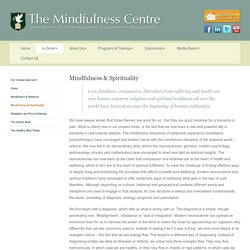
We have always known that those themes ‘are good for us’, that they are good medicine for a humanity in pain. What is utterly new in our present times, is the fact that we now have a new and powerful ally in humanity’s road towards wisdom. The mindfulness disciplines of subjective experience (meditation, psychotherapy) have converged and shaken hands with the mindfulness discipline of the objective world – science. We now live in an extraordinary time, where the neurosciences, genetics, modern psychology, anthropology, physics and mathematics have converged to shed new light on spiritual insights.
Consciousness. Mummified 200-year-old monk found in Mongolia in 'very deep meditation', Buddhist academic claims. A Buddhist academic has said a 200-year-old mummified monk discovered in Mongolia may not be dead but in a "very deep meditation".
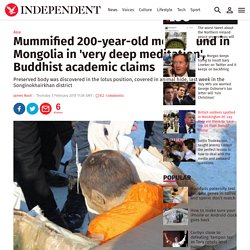
The preserved body was discovered in the lotus position, covered in animal hide, last week in the Songinokhairkhan district, close to the Mongolian capital Ulaanbaatar. Forensic examinations are being carried out on the remains, which investigators believe belong to a man who may have been a Lama, or a teacher of Tibetan Buddhism. Now, an expert has claimed the monk may have been in a rare spiritual state known as "tukdam". Ganhugiyn Purevbata, founder and professor of the Mongolian Institute of Buddhist Art at Ulaanbaatar Buddhist University, told The Siberian Times: "Lama is sitting in the lotus position vajra, the left hand is opened, and the right hand symbolizes of the preaching Sutra.
"This is a sign that the Lama is not dead, but is in a very deep meditation according to the ancient tradition of Buddhist lamas. " Vladislav L. Thích Nhất Hạnh. Buddhist monk and peace activist Thích Nhất Hạnh (; Vietnamese: [tʰǐk̟ ɲə̌t hâjŋ̟ˀ] ( listen); born as Nguyễn Xuân Bảo[2] on 11 October 1926[3]) is a Vietnamese Thiền Buddhist monk, peace activist, and founder of the Plum Village Tradition.
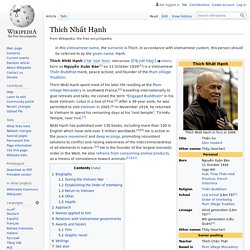
Thích Nhất Hạnh spent most of his later life residing at the Plum Village Monastery in southwest France,[4] travelling internationally to give retreats and talks. He coined the term "Engaged Buddhism" in his book Vietnam: Lotus in a Sea of Fire.[5] After a 39-year exile, he was permitted to visit Vietnam in 2005.[6] In November 2018, he returned to Vietnam to spend his remaining days at his "root temple", Từ Hiếu Temple, near Huế.[7] Biography[edit] Nhất Hạnh was born as Nguyễn Xuân Bảo on October 11, 1926, into a large family in the ancient imperial capital of Huế in Central Vietnam. Buddha hall of the Từ Hiếu Pagoda During the Vietnam War[edit] Establishing the Order of Interbeing[edit] Return to Vietnam[edit] Zen master Thich Nhat Hanh: only love can save us from climate change. Zen master Thich Nhat Hanh, one of the world's leading spiritual teachers, is a man at great peace even as he predicts the possible collapse of civilisation within 100 years as a result of runaway climate change.
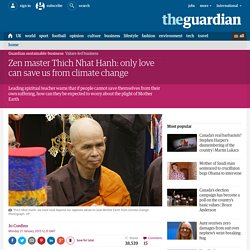
The 86-year-old Vietnamese monk, who has hundreds of thousands of followers around the world, believes the reason most people are not responding to the threat of global warming, despite overwhelming scientific evidence, is that they are unable to save themselves from their own personal suffering, never mind worry about the plight of Mother Earth. Thay, as he is known, says it is possible to be at peace if you pierce through our false reality, which is based on the idea of life and death, to touch the ultimate dimension in Buddhist thinking, in which energy cannot be created or destroyed. Look beyond fear "Our perception of time may help," Thay told me in his modest home in Plum Village monastery near Bordeaux. Confront the truth "They want to get busy in order to forget. Williams Kabat Zinn. Want to be happy? SLOW DOWN. In 1972, Matthieu Ricard had a promising career in biochemistry, trying to figure out the secrets of E. coli bacteria.
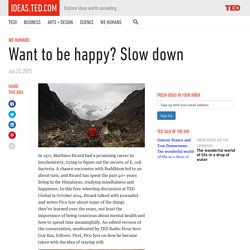
A chance encounter with Buddhism led to an about turn, and Ricard has spent the past 40+ years living in the Himalayas, studying mindfulness and happiness. In this free-wheeling discussion at TED Global in October 2014, Ricard talked with journalist and writer Pico Iyer about some of the things they’ve learned over the years, not least the importance of being conscious about mental health and how to spend time meaningfully. An edited version of the conversation, moderated by TED Radio Hour host Guy Raz, follows. First, Pico Iyer on how he became taken with the idea of staying still: Pico Iyer: When I was in my twenties, I had this wonderful 25th-floor office in midtown Manhattan, in Rockefeller Center — and I had a really exhilarating life, I thought, writing on world affairs for Time magazine. And so I left all that behind. MR: I hear that a lot.
PI: Yes.